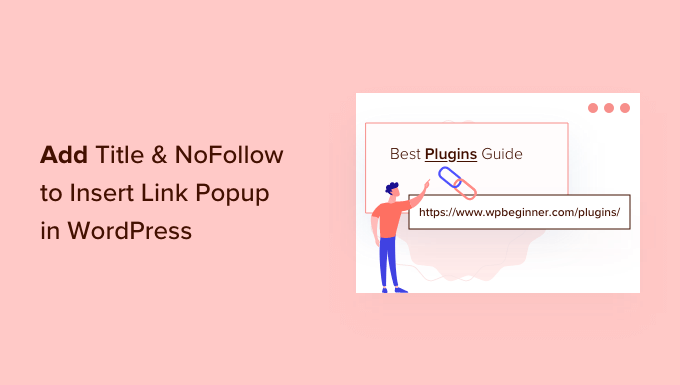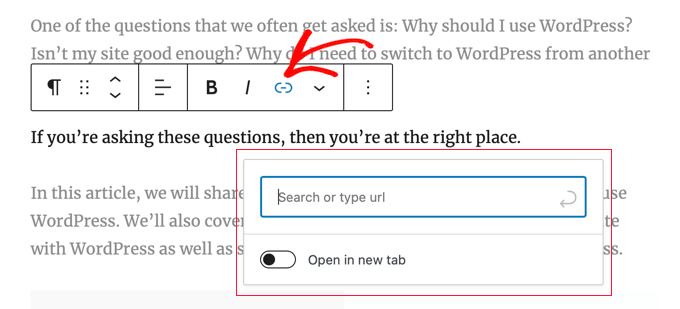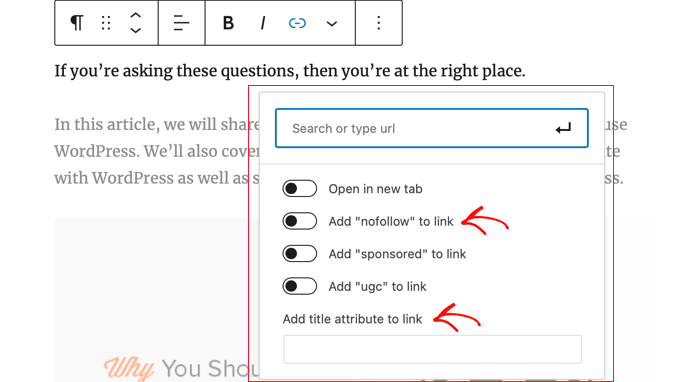¿Quieres saber un par de retoques sencillos que hacemos en WPBeginner para mejorar seriamente nuestros enlaces? Estamos hablando de cosas que mejoran tanto la experiencia del usuario como el SEO. Añadimos un atributo title a cada enlace y utilizamos la etiqueta nofollow en muchos enlaces externos.
El atributo title puede parecer pequeño, pero marca una verdadera diferencia. Ofrece a los visitantes una pequeña vista previa de adónde les llevará un enlace incluso antes de hacer clic. Y nofollow indica a los motores de búsqueda qué es importante en nuestro sitio y cómo queremos compartir (o no compartir) la autoridad del enlace.
Pero aquí está la cosa que nos hemos topado – WordPress por sí mismo no hace que sea fácil añadir cualquiera de estos. Un poco frustrante, ¿verdad?
Este artículo proporciona una guía práctica sobre cómo añadir opciones para los atributos title y nofollow a la ventana emergente Insertar enlace en WordPress, agilizando su flujo de trabajo e impulsando sus esfuerzos de SEO.

¿Por qué añadir atributos Title y NoFollow a los enlaces en WordPress?
Cuando escribes contenido, naturalmente añades enlaces, ¿verdad? Así conectas tus propias entradas y páginas y remites a otros recursos útiles. Lo hacemos todo el tiempo.
Estos enlaces orientan a los usuarios y les proporcionan información adicional. Pero no siempre basta con enlazar. Por eso nos gusta dar un título a nuestros enlaces. Ese pequeño texto que aparece al pasar el cursor por encima de un enlace.
Hemos descubierto que añadir un título es muy útil para los lectores. Es como darles una pequeña vista previa o una pista acerca de a dónde van si hacen clic.
Oh, ese enlazar va a un artículo acerca de cómo crear direcciones de correo electrónico gratuitas para empresas”, pensarán al ver el título. Esto les aclara las cosas y les da más seguridad.

Además, y esto es un buen extra, también puede dar un empujoncito a tu SEO. A los motores de búsqueda parece gustarles ese contexto adicional.
Ahora, hablemos de nofollow. Es algo que usamos mucho, sobre todo cuando enlazamos a otros sitios web.
Básicamente, el atributo nofollow es una forma de decir a los motores de búsqueda: ‘Oye, puedes seguir este enlace, pero no pases ninguna autoridad de enlace a ese otro sitio desde nuestro sitio’. Suena un poco técnico, pero en realidad es bastante sencillo una vez que se le coge el truco.
Los expertos en SEO recomiendan a menudo utilizar el atributo nofollow para enlazar enlaces externos, y nosotros estamos de acuerdo en algunas situaciones. No se trata de ser antipático. Se trata más bien de gestionar cómo fluye la autoridad de los enlaces en la web y de centrarse en lo que es más importante para nuestro SEO.
Por ejemplo, si enlazamos a un sitio que no apoyamos totalmente o si se trata de un patrocinador, nofollow es definitivamente nuestra opción.
Pero aquí está la parte molesta. Cuando estás en WordPress y haces clic en el botón “Insertar enlace”, ¡te das cuenta de que no hay opciones para añadir un título al enlace o hacer que un enlace sea nofollow! ¿En serio? Todo lo que tienes es el campo URL del enlace y una casilla de verificación para abrirlo en una nueva ventana.

Es un poco básico y, sinceramente, no es muy útil para cualquiera que se preocupe por el SEO o la experiencia del usuario. Estamos convencidos de que WordPress podría mejorarlo.
Dicho esto, veamos cómo añadir fácilmente opciones de título y nofollow a la ventana emergente Insertar enlace en su blog de WordPress.
Cómo añadir título y NoFollow para enlazar ventana emergente en WordPress
Entonces, ¿cómo podemos corregir esto? Lo primero que tienes que hacer es instalar el plugin gratuito All in One SEO Lite. Para más detalles, consulte nuestra guía paso a paso sobre cómo instalar un plugin de WordPress.
Hemos estado recomendando AIOSEO durante años – es simplemente el mejor plugin de SEO para WordPress que existe, en nuestra opinión. Y solo necesitas la versión gratuita para obtener estas opciones adicionales para enlazar, lo cual es fantástico. Por supuesto, AIOSEO Pro es aún más potente si usted es serio acerca de la clasificación superior.
Una vez activado, deberá configurar el plugin mediante el asistente de configuración de AIOSEO. Para obtener instrucciones detalladas, consulte nuestra guía práctica sobre cómo establecer All in One SEO para WordPress.
Una vez hecho esto, el plugin añadirá automáticamente atributos adicionales a la ventana emergente que aparece al hacer clic en el botón Insertar enlace.
Incluye un campo de título y opciones para añadir etiquetas nofollow, patrocinador y UGC (contenido generado por el usuario).

Para añadir el título del enlace, escríbalo en el campo “Añadir atributo de título al enlace”. Al enlazar, AIOSEO aplicará el título y los atributos que usted active.
Guías de expertos para enlazar en WordPress
Esperamos que este tutorial te haya ayudado a aprender cómo añadir opciones de título y nofollow al mensaje / ventana emergente Insertar enlace en WordPress. Puede que también quieras ver nuestras mejores guías sobre cómo crear, seguir y enlazar enlaces en tu sitio WordPress:
- Guía para principiantes sobre cómo añadir un enlace en WordPress
- Enlaces internos para SEO: La guía definitiva de las mejores prácticas
- Los mejores plugins de enlazado interno para WordPress (automático + manual)
- Cómo hacer el seguimiento de los clics en enlaces y botones en WordPress (de forma sencilla)
- Cómo encontrar y corregir enlaces rotos en WordPress (paso a paso)
If you liked this article, then please subscribe to our YouTube Channel for WordPress video tutorials. You can also find us on Twitter and Facebook.





Jiří Vaněk
I would like to ask, within the scope of SEO, if I want only external links to have the nofollow attribute. Leave internal links as they are, but set nofollow indiscriminately for all external links. I want this in order for the robot on my website not to follow external links. How to solve it? Through a snippet of code or a plugin?
WPBeginner Support
We have a guide on how to nofollow external links that you should find helpful below
https://www.wpbeginner.com/plugins/how-to-nofollow-all-external-links-in-wordpress/
Admin
Stuart
Hi there,
It’s worth noting this won’t work in the Gutenberg editor.
Cheers.
WPBeginner Support
We’ll be sure to look into updating this article
Admin
Editorial Staff
The article has been updated to reflect a new solution which works in both Gutenberg as well as classic editor.
Admin
Kulwant
can this plugin slow down over website speed ?
WPBeginner Support
Hi Kulwant,
No, it doesn’t affect site speed.
Admin
Bikramjit
Hi,
I have added link of some research journals, they are like authorities. Should I keep those link as nofollow link.
best regards
Bikramjit
John
I read this article today and installed the plugin, but it hasn’t been updated for the last 2 years?
Is it still a safe and good plugin to use then? Or is there a better one by now?
I have seen quite some nofollow plugins but none that include the Title as well.
Any advice would be nice :).
Great article!
WPBeginner Support
Hi John,
We reached out to the plugin author and they have updated the plugin. You can now safely install it on your website.
Admin
Jasmin
Hi, great tutorial!!! Can you please tell me how you added the hyperlink to the “Editorial Staff” text beneath the title?
Theodore Nwangene
This is really a very awesome tutorial,
I understand how important it is to nofollow our external links especially when its an affiliate link and thats what made this post amazing.
A friend was just asking me the other day how to easily make a link nofollow now, which other way will be easier than what you just explained here?
I’m going to forward this post to him right away and will also download the plugin as soon as possible.
Thanks for sharing.
Viacheslav
Isn’t that simpler to add rel=”nofollow” and title manually when adding the link in the TEXT mode? I usually do this with no bother
WPBeginner Support
Yes you can do that too if you find it more convenient.
Admin
Barry Richardson
Am I assuming correctly that each link on a blog would have to be individually set? After all, we might want to “do-follow” some outbound links and “no-follow” others – or we might want to link to a different post on the same site, which typically should be “do-follow”.
WPBeginner Support
Yes this is why this plugin is helpful. You can leave the nofollow box unchecked if you want to create a dofollow link.
Admin
John D
I’very never understood why WP by default has no title attribute to set in its link dialog. Blogger had it in 2008!
WPBeginner Support
WordPress had it too. It was removed in WordPress 4.2.
Admin
Olivia Smith
Do we have to change HTML setting individually for every blog we post ?
WPBeginner Support
No, unless you want to.
Admin
Connor Rickett
The real question is, Why isn’t this isn’t a default feature in WordPress?
I mean, all it needs is a little checkbox in the link section, follow/nofollow, and, poof, powerful new feature. No muss, no fuss, barely any tears.
Mark Corder
“but you don’t want to pass away any link authority to these websites.” …
What exactly is meant by that?
Atila
It means that you don’t want search engines to pick up that link while crawling. The link is there for reference or for whatever reason, and you are not giving him your PR juice. It would be bad to have a website full of dofollow outbound links, especially if they lead to poor content website. Only leave clean links to sites that you care of and are important.
Gulshan
Please make a list of Perfect plugin to manage all over SEO.